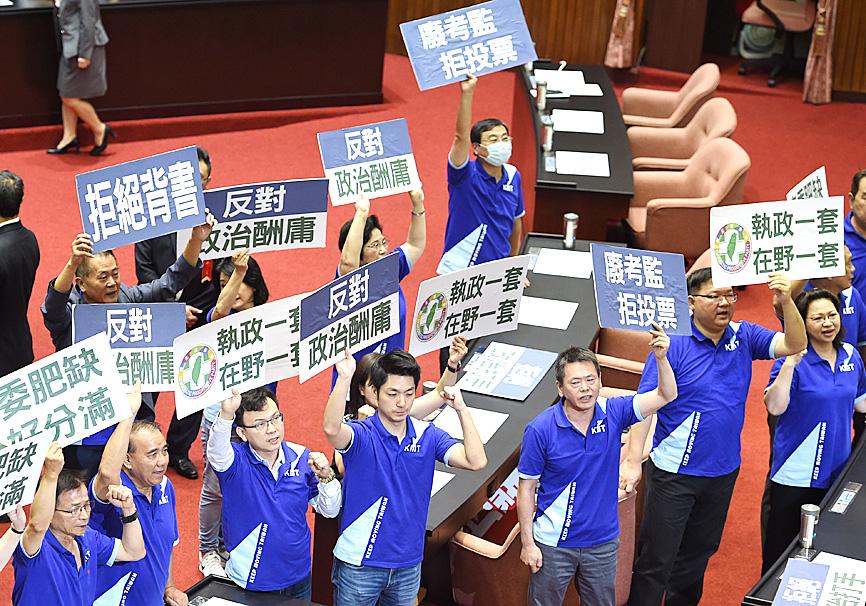The Legislative Yuan yesterday approved Examination Yuan and National Communications Commission (NCC) nominees after Democratic Progressive Party (DPP) lawmakers voted in favor of the nominations.
Examination Yuan presidential nominee Huang Jong-tsun (黃榮村), a former minister of education and China Medical University president, and vice presidential nominee Chou Hung-hsien (周弘憲), a former minister of civil service, each received 65 “yes” and three “no” votes.
The Legislative Yuan also approved nine Examination Yuan members: Council of Indigenous Peoples Deputy Minister Iwan Nawi; former Overseas Community Affairs Council minister Wu Hsin-hsing (吳新興); former deputy minister of education Yao Leeh-ter (姚立德); former department of health deputy director Wang Hsiu-hung (王秀紅); current Examination Yuan members Chen Tsi-yang (陳慈陽) and Yang Ya-hwei (楊雅惠); National Chengchi University Department of Public Finance chairwoman Ho Yi-cheng (何怡澄); Chang Jung Christian University professor emeritus Chen Chin-seng (陳錦生); and National Taiwan University professor Chou Lien-siang (周蓮香).

Photo: Liu Hsin-de, Taipei Times
Chen Chin-seng and Chou Lien-siang received 63 “yes,” three “no” and one spoiled votes, while the other nominees were approved with 64 “yes” and three “no” votes.
During a question-and-answer session at the Legislative Yuan on Wednesday, Huang said that as head of the Examination Yuan, he would comply with any legislative efforts to abolish the Examination Yuan and the Control Yuan — a cause that has been advocated by many people.
If the legislature amends the Constitution to phase out these branches, Huang said he would ensure that the Examination Yuan transfers to other agencies its responsibilities for designing civil service entrance tests and evaluating the performances of civil servants.
Prior to the vote, three New Power Party (NPP) lawmakers said they would vote against the nominations, based on their refusal to turn in an eight-question survey from the lawmakers, which they said showed the nominees’ “arrogance.”
Acting NCC Chairman Chen Yaw-hsyang (陳耀祥) and former NCC deputy chairman Wong Po-tsung (翁柏宗) yesterday became NCC chairman and deputy chairman respectively after receiving a majority the DPP caucus’ votes.
First-time nominees National Taiwan University Graduate Institute of Journalism professor Lin Lih-yun (林麗雲) and National Taiwan Normal University Graduate Institute of Mass Communication chairwoman Wang Wei-ching (王維菁), as well as NCC spokesman Hsiao Chi-hung (蕭祈宏), were also approved.
The NPP caucus said prior to the vote that they would only approve the first-time nominees, as the incumbents and holdovers from the agency had not adequately cracked down on Chinese-sponsored media from churning out “fake news.”
Chinese Nationalist Party (KMT) lawmakers withdrew from the vote and scrawled protests on the ballots, accusing the DPP of using the independent agency as a tool for persecuting political rivals.
Additional reporting by Chen Yun and Wu Su-wei

The Grand Hotel Taipei on Saturday confirmed that its information system had been illegally accessed and expressed its deepest apologies for the concern it has caused its customers, adding that the issue is being investigated by the Ministry of Justice Investigation Bureau. The hotel said that on Tuesday last week, it had discovered an external illegal intrusion into its information system. An initial digital forensic investigation confirmed that parts of the system had been accessed, it said, adding that the possibility that some customer data were stolen and leaked could not be ruled out. The actual scope and content of the affected data

‘LIKE-MINDED PARTNER’: Tako van Popta said it would be inappropriate to delay signing the deal with Taiwan because of China, adding he would promote the issue Canadian senators have stressed Taiwan’s importance for international trade and expressed enthusiasm for ensuring the Taiwan-Canada trade cooperation framework agreement is implemented this year. Representative to Canada Harry Tseng (曾厚仁) in an interview with the Central News Agency (CNA) said he was increasingly uneasy about Ottawa’s delays in signing the agreement, especially as Ottawa has warmed toward Beijing. There are “no negotiations left. Not only [is it] initialed, we have three versions of the text ready: English, French and Mandarin,” Tseng said. “That tells you how close we are to the final signature.” Tseng said that he hoped Canadian Prime Minister Mark Carney

POSITIVE DEVELOPMENT: Japan and the US are expected to hold in-depth discussions on Taiwan-related issues during the meeting next month, Japanese sources said The holding of a Japan-US leaders’ meeting ahead of US President Donald Trump’s visit to China is positive news for Taiwan, former Japan-Taiwan Exchange Association representative Hiroyasu Izumi said yesterday. After the Liberal Democratic Party’s landslide victory in Japan’s House of Representatives election, Japanese Prime Minister Sanae Takaichi is scheduled to visit the US next month, where she is to meet with Trump ahead of the US president’s planned visit to China from March 31 to April 2 for a meeting with Chinese President Xi Jinping (習近平). Japan and the US are expected to hold in-depth discussions on Taiwan-related issues during the

President William Lai (賴清德) yesterday bestowed one of Taiwan’s highest honors on Saint Vincent and the Grenadines (SVG) Ambassador Andrea Clare Bowman in recognition of her contributions to bilateral ties. “By conferring the Order of Brilliant Star with Grand Cordon on Ambassador Bowman today, I want to sincerely thank her, on behalf of the Taiwanese people, for her outstanding contribution to deepening diplomatic ties between Taiwan and SVG,” Lai said at a ceremony held at the Presidential Office in Taipei. He noted that Bowman became SVG’s first ambassador to Taiwan in 2019 and